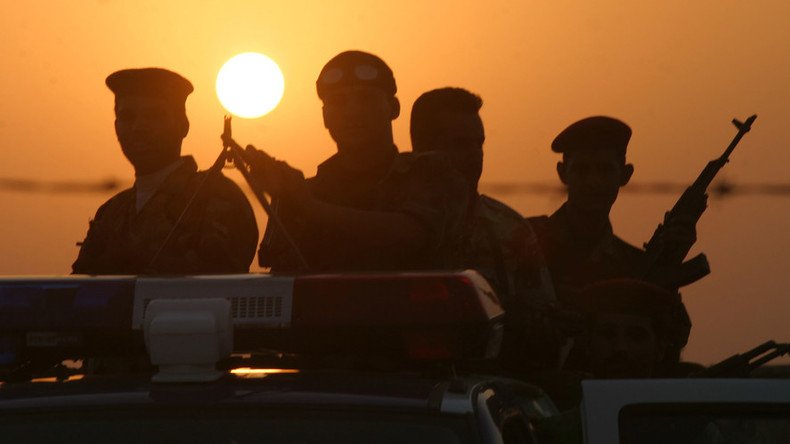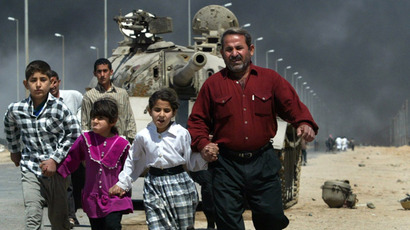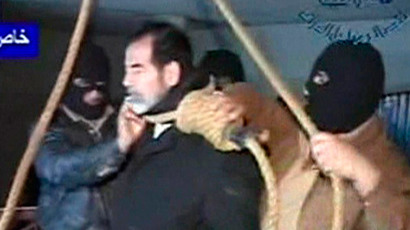Baghdad still paying for mistakes of ill-fated Kuwait invasion – ex-Iraqi Naval chief

Iraq’s ill-advised intervention into Kuwait a quarter of a century ago is still hurting the country, says former diplomat and ex-navy chief General Abdo Al-Deiry. He blames Saddam Hussein, saying “he was living in the world of myths and illusions.”
Twenty-five years ago, US troops entered Kuwait after the tiny Gulf nation had been invaded by its neighbor Iraq. Within a matter of weeks, Iraqi leader Saddam Hussein had suffered a demoralizing defeat at the hands of the US-led coalition.
According to General Abdo Al-Deiry, who was a commander in chief of the Iraqi Navy and, subsequently, a diplomat at the time of Operation Desert Storm, Iraq’s defeat was all but inevitable as Baghdad had failed to heed warnings to “immediately halt” its invasion from both at home and abroad, while believing an Arab coalition would never attack a fellow Arab nation.
Al-Deiry spoke to RT in an extended interview in which he recalled that he was one of the few people in power in Iraq who was against the move, as he realized the dangerous ramifications of a misadventure in Kuwait. Trying to convey such thoughts to the Iraqi hierarchy was not only a pointless, but also dangerous, however “Saddam was a person leaning to violence,” Al-Deiry mentioned.
“Saddam invaded Kuwait because it was his own personal whim and this characterized him at his best,” while there was also a belief that “Kuwait made up part of Iraq and one should restore control over these territories.” Saddam was also power hungry, according to the former Iraqi Navy chief.
He wanted to have a greater say in how the Iraqi military was run and the invasion of Kuwait provided him with the perfect opportunity to increase his leverage. He was apparently so set on his plan, that he ignored the fact that the US had its own particular interests in the Gulf region. “He wanted to acquire the military rank of Lieutenant General in the Iraqi armed forces in order to monopolize power within military circles,” Al-Deiry recalled. Despite already being deputy chief in the Revolutionary Council, this would allow him to issue orders to high profile generals within the organization.
Al-Deiry, who was Iraq’s ambassador to Switzerland at the time Iraqi forces invaded Kuwait, recalled that the Swiss had warned Baghdad that it should look towards a diplomatic solution to the conflict if it wanted to avoid “painful consequences.”
Al-Deiry’s hopes of finding a peaceful solution were dashed, however, when he was told by Foreign Minister Tariq Aziz to break off all contacts with the Swiss.
Despite potentially having to face the military might of the US and its allies, Saddam was not too concerned, as he believed that an Arab coalition would never attack a fellow Arab nation, according to Al-Deiry.
“Saddam was convinced that the coalition would fail because Arab people wouldn’t go against him but instead would stand for him,” he said. He also believed that any intervening force would go no further than Baghdad. “I’m not sure that his mind was clear and sound. He was living in the world of myths and illusions,” Al-Deiry added.
The Iraqi president was also guilty of nepotism, Al-Deiry claims. He recalls a situation when the husband of Saddam’s daughter, who had once been a mere police captain, would later be promoted to minister of defense.
"Around him there was a group of poorly educated people and low-rank officers like Taha Yasin Ramadan Al-Jizrawi and Ali Hassan Al-Majid, who had been an engineer officer in the Air Force and suddenly became Defense Minister."
The military itself was in a poor state. A vast number of soldiers were fresh recruits – far from being ready for combat operations. Al-Deiry also pointed to discipline problems within the armed forces, where instead of calling those in higher positions “comrade,” as was customary, they were told to address their seniors as “My Master,” which was “a distressing development.”
Iraq’s invasion of Kuwait is seen by Al-Deiry as being the “first nail in the coffin of the Iraqi state.” A quarter of a century on from Operation Desert Storm, Baghdad has now been facing a threat from Islamic State for almost a year and a half.
“Iraq won’t be allowed to restore its former power. The conflict in the region is still long term and coming catastrophes will be unimaginable,” he concluded.
The statements, views and opinions expressed in this column are solely those of the author and do not necessarily represent those of RT.














